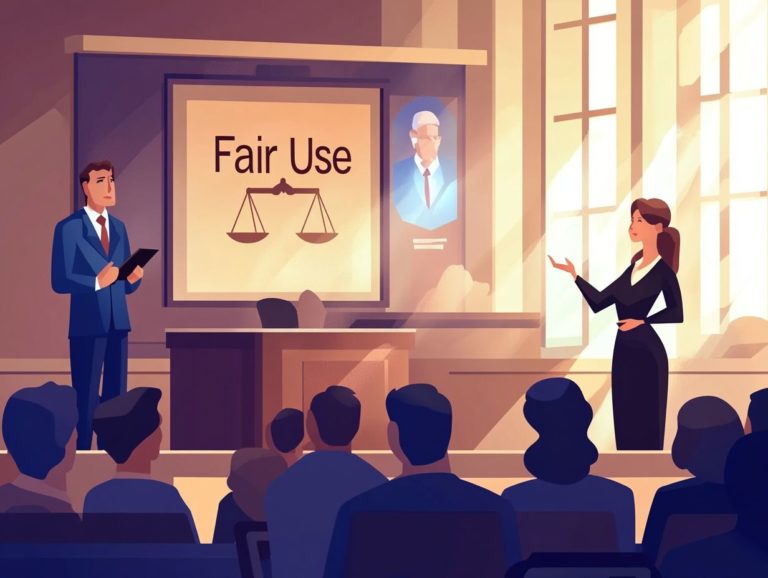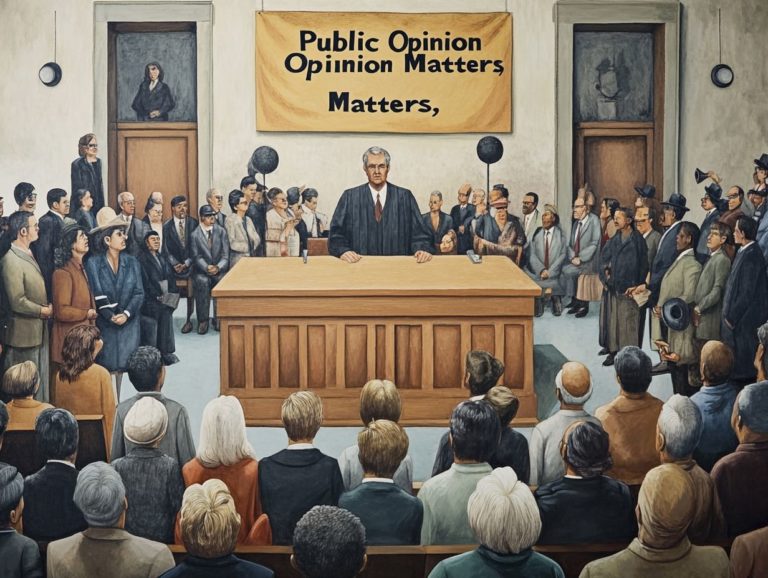The Importance of Licensing in IP Litigation
Understanding IP litigation is vital for your success. Let s dive into how licensing can empower your innovations!
Intellectual Property (IP) litigation can be a complex challenge, but grasping the subtleties of licensing can profoundly influence the resolution of disputes.
This article aims to demystify the complexities of IP laws and shed light on the pivotal role that licensing plays in litigation.
You ll discover the various types of licensing agreements, along with the advantages and challenges they entail, as well as best practices to navigate this vital aspect of IP law.
Whether you re a legal professional or a business owner, this guide equips you with essential insights for effective IP management.
Contents
- Key Takeaways:
- Understanding Intellectual Property (IP) Litigation
- Role of Licensing in IP Litigation
- Benefits of Licensing in IP Litigation
- Challenges and Risks of Licensing in IP Litigation
- Best Practices for Licensing in IP Litigation
- Frequently Asked Questions
- What is the importance of licensing in IP litigation?
- How does licensing impact IP litigation cases?
- What are the benefits of obtaining a license in IP litigation?
- What are the consequences of not obtaining a license in IP litigation?
- How can a lawyer assist with licensing in IP litigation?
- Is obtaining a license always necessary in IP litigation?
Key Takeaways:
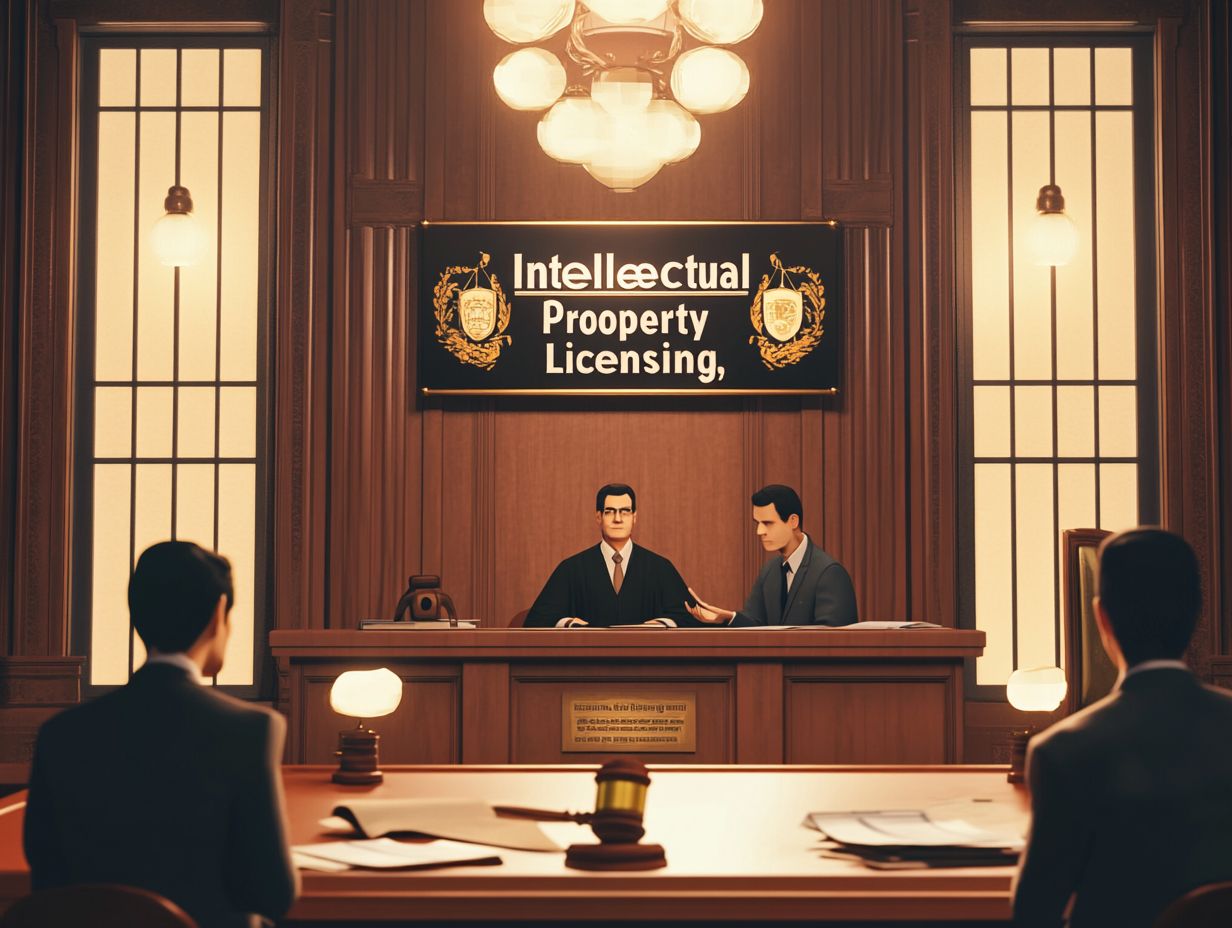
Licensing is your secret weapon in IP litigation! It protects your rights and opens doors to new opportunities. But beware! Missteps can lead to disputes. To avoid these pitfalls, it’s essential to understand the role of the court in IP litigation. Let’s explore how to make licensing work for you.
Understanding Intellectual Property (IP) Litigation
Grasping the nuances of Intellectual Property (IP) litigation is essential for anyone navigating the intricate landscape of intellectual property rights, which includes patents, trademarks, and copyrights.
The legal framework governing IP litigation delves into critical aspects of ownership, infringement, and enforcement. It safeguards the control that creators have over their innovations and commercial pursuits.
Within this realm, licensing agreements are of paramount importance. These legal contracts delineate the terms and conditions under which a licensor permits a licensee to utilize their IP.
These agreements can greatly influence how much money you make and impact market dynamics, shaping the business landscape in profound ways.
Overview of IP Laws and Disputes
IP laws offer a robust framework for protecting intellectual property, ensuring that you, as a creator, can shield your innovations from unauthorized use and infringement.
These laws protect a variety of areas, including patents for inventions, copyrights for artistic works, and trademarks for brand names.
As your creative and commercial endeavors continue to evolve, the potential for disputes arising from these protections becomes increasingly likely. It s essential for you to grasp the nuances of each type of IP law, especially when navigating licensing agreements.
By adhering to these agreements, you can significantly reduce the likelihood of legal disputes, minimizing the risk of enforcement challenges for both you and those who seek to use your creations in the ever-competitive marketplace.
Role of Licensing in IP Litigation
Licensing is essential in IP litigation, acting as a strategic tool to safeguard your intellectual property while enabling commercialization and revenue generation. For more insights, consider exploring the role of licensing in litigation.
A well-crafted licensing agreement between you and the licensee can greatly reduce litigation risks and ensure compliance with IP laws. These agreements not only clarify your rights and responsibilities but also lay the groundwork for enforcement actions should infringement occur.
The structure and terms of these licensing agreements can significantly impact market dynamics and the valuation of your IP assets. This emphasizes the importance of their negotiation and management in the context of IP litigation.
Definition and Purpose of Licensing
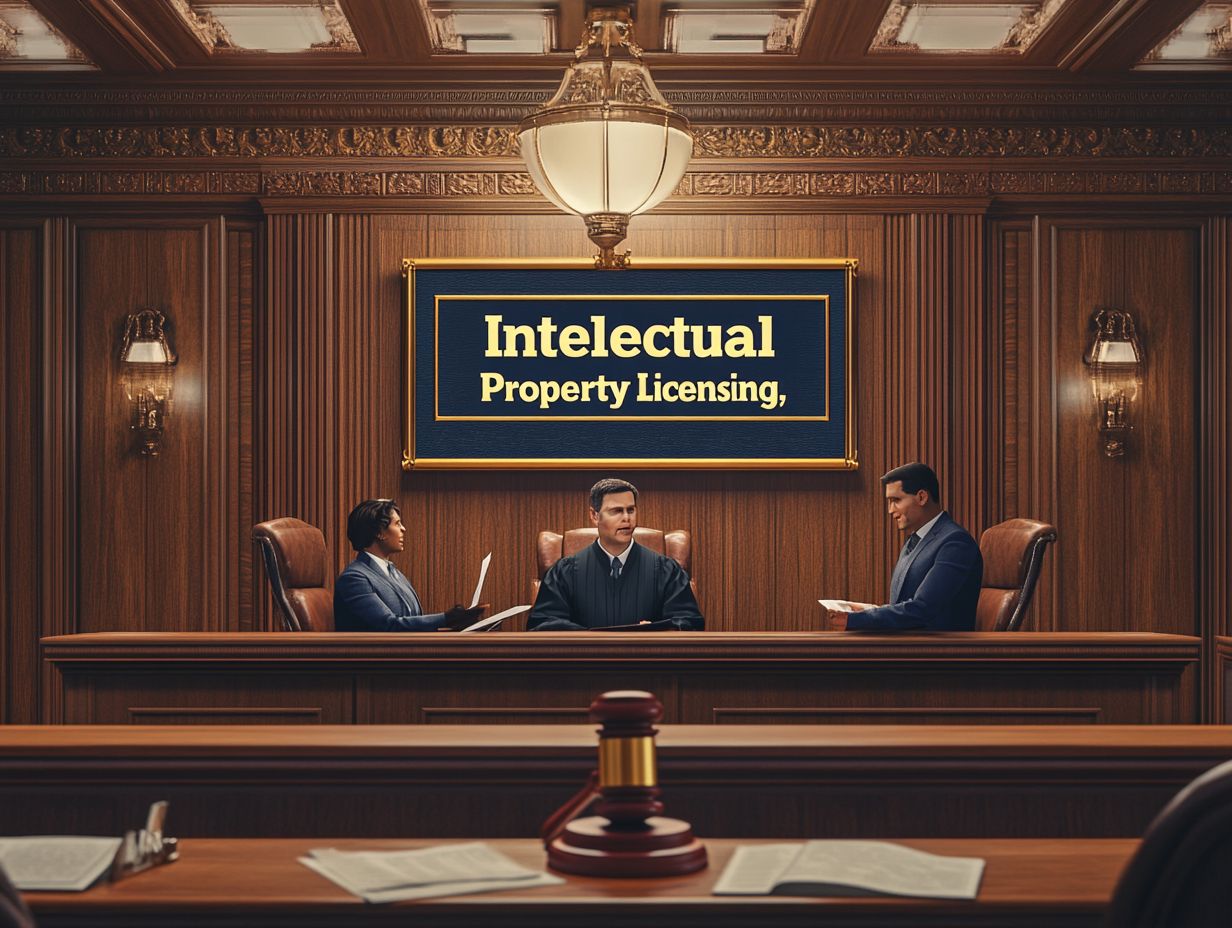
Licensing is the process through which a licensor grants you permission to use, produce, or sell a product or service protected by legal rights that safeguard creations like inventions and brands, such as patents, trademarks, or copyrights.
This mechanism serves multiple purposes in commercialization. It allows you to leverage your innovations and generate revenue without giving up ownership of your intellectual property. By effectively licensing your products or services, you can create significant value and expand your market reach.
Licensing also helps manage risks, enabling you to share potential liabilities with licensees. Understanding the various types of licensing agreements is essential during IP litigation since the details can substantially impact dispute outcomes.
Types of Licensing Agreements
You ll encounter several types of licensing agreements, primarily categorized as exclusive or non-exclusive licenses. Each shapes the rights and obligations of the parties involved in distinct ways.
Exclusive licenses grant you the sole right to use the intellectual property, preventing the licensor from issuing additional licenses for that specific use. In contrast, non-exclusive licenses allow multiple parties to tap into the same intellectual property, leading to broader market access but potentially diluting exclusivity.
You might also come across sole licenses, where the licensor retains the right to use the intellectual property while granting you exclusivity. Terms such as duration, payment structures, and territorial limitations are crucial in defining these relationships.
For instance, if you re a technology firm licensing software, you may negotiate terms that specify not only royalties but also implications regarding future updates. These details can create avenues for potential disputes, which can be pivotal in the realm of intellectual property litigation.
Benefits of Licensing in IP Litigation
Licensing in IP litigation presents numerous advantages for both licensors and licensees. It acts as a strategic tool to elevate market value, create revenue streams, and cultivate collaboration, highlighting the role of IP licensing in strategy.
By engaging in a licensing agreement, you can make money from your intellectual property while securing legal safeguards against potential infringement.
For licensees, acquiring a license cuts down on the risks tied to IP disputes, providing access to invaluable innovations that can propel business growth. This mutually beneficial relationship maximizes the utility of intellectual property and enriches the market landscape, making it more dynamic and competitive.
Advantages for Both Parties
You can unlock significant advantages through effective licensing arrangements. These pave the way for stable revenue streams and a strengthened market presence.
For licensors, retaining control over intellectual property is essential. This control gives you the power to dictate how your creations are utilized and marketed while maintaining the integrity of your brand. These arrangements can lead to consistent revenue, as licensing fees bolster your bottom line without incurring extensive production or distribution costs.
On the flip side, as a licensee, you gain immediate access to innovative products or technologies. This approach dramatically lowers your risk of infringement, giving you peace of mind.
For example, a tech company that licenses a patented algorithm can swiftly introduce a new app, leveraging existing innovations while sidestepping legal complications.
Challenges and Risks of Licensing in IP Litigation
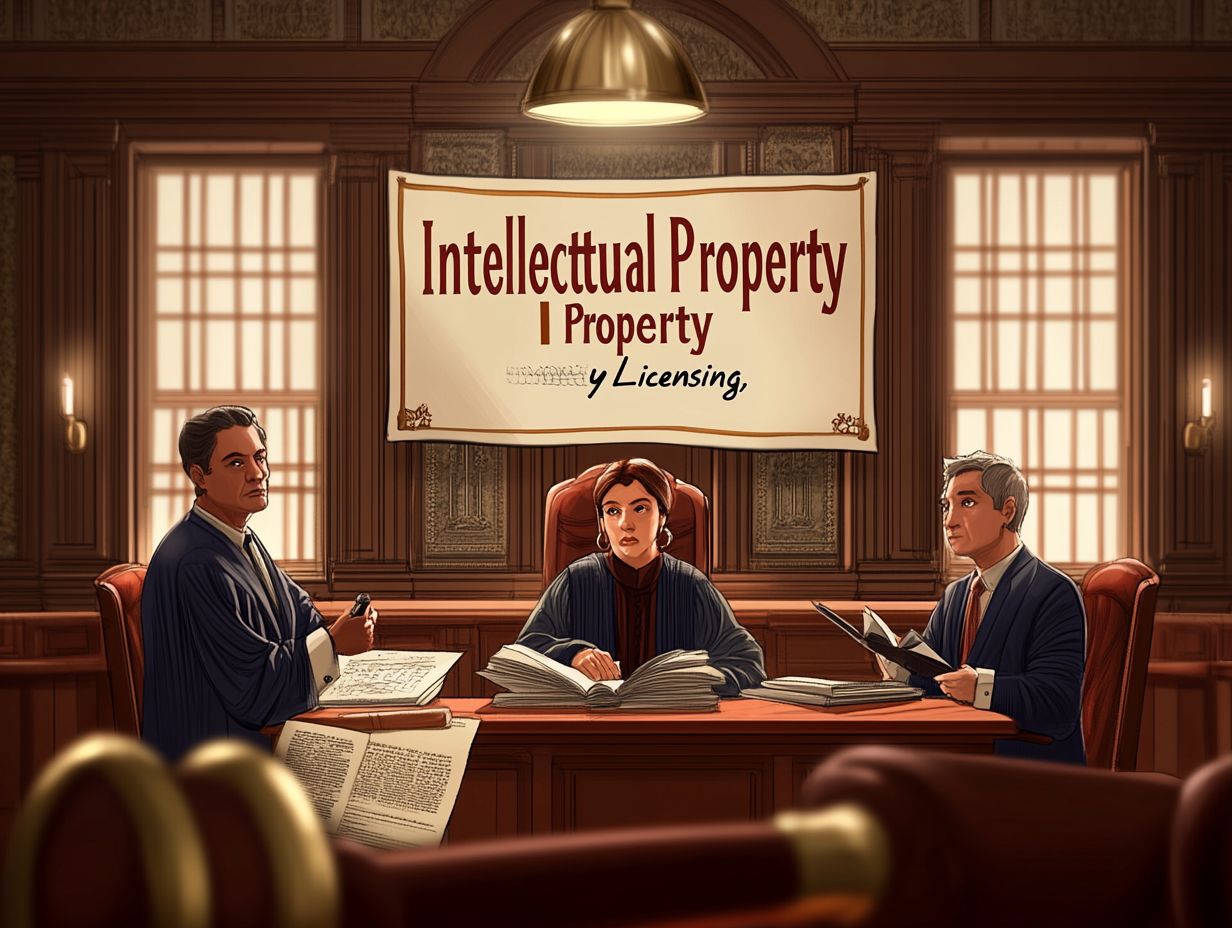
Licensing offers significant advantages; however, it also brings challenges and risks in IP litigation that require careful planning, as highlighted in the role of licensing agreements in intellectual property.
A key hurdle is negotiating terms that protect both parties. You must also ensure that the licensing agreement meets regulatory standards.
It’s essential to address enforcement and potential infringement issues. These can complicate the licensing process and expose both sides to risks.
Recognizing these challenges is vital for anyone in IP litigation. It helps you create effective strategies to protect your rights.
Common Issues and How to Address Them
Licensing agreements often face issues like disputes over terms and compliance failures. Misunderstandings about intellectual property rights can lead to costly litigation.
These issues often arise from vague language in the contract. For example, a licensee might believe they have exclusive rights, while the licensor has made other arrangements.
To reduce risks, all parties should engage in thorough discussions. Clarifying expectations before finalizing any agreement is key.
Clearly articulated contract terms foster better relationships and lower the chance of future disputes.
Best Practices for Licensing in IP Litigation
Implementing best practices for licensing is crucial. This ensures your agreements are effective, compliant, and beneficial for everyone involved.
Prioritize thorough due diligence during negotiations. Assess the value of the intellectual property and understand market conditions.
Open communication and collaboration enhance the licensing process. This leads to successful partnerships and minimizes dispute risks.
By following these best practices, you can boost your licensing agreements and improve your overall IP management strategies.
Key Considerations for Successful Licensing
Keep several key considerations in mind for successful licensing agreements. It’s essential to understand negotiation intricacies, as they shape the outcome.
Be clear about contract terms, focusing on royalties, duration, and termination clauses. Compliance with legal requirements is critical; overlooking them can result in disputes.
Understanding market dynamics enables strategic decisions that benefit both parties. Integrating these factors into your process creates a collaborative environment for mutual growth.
Frequently Asked Questions
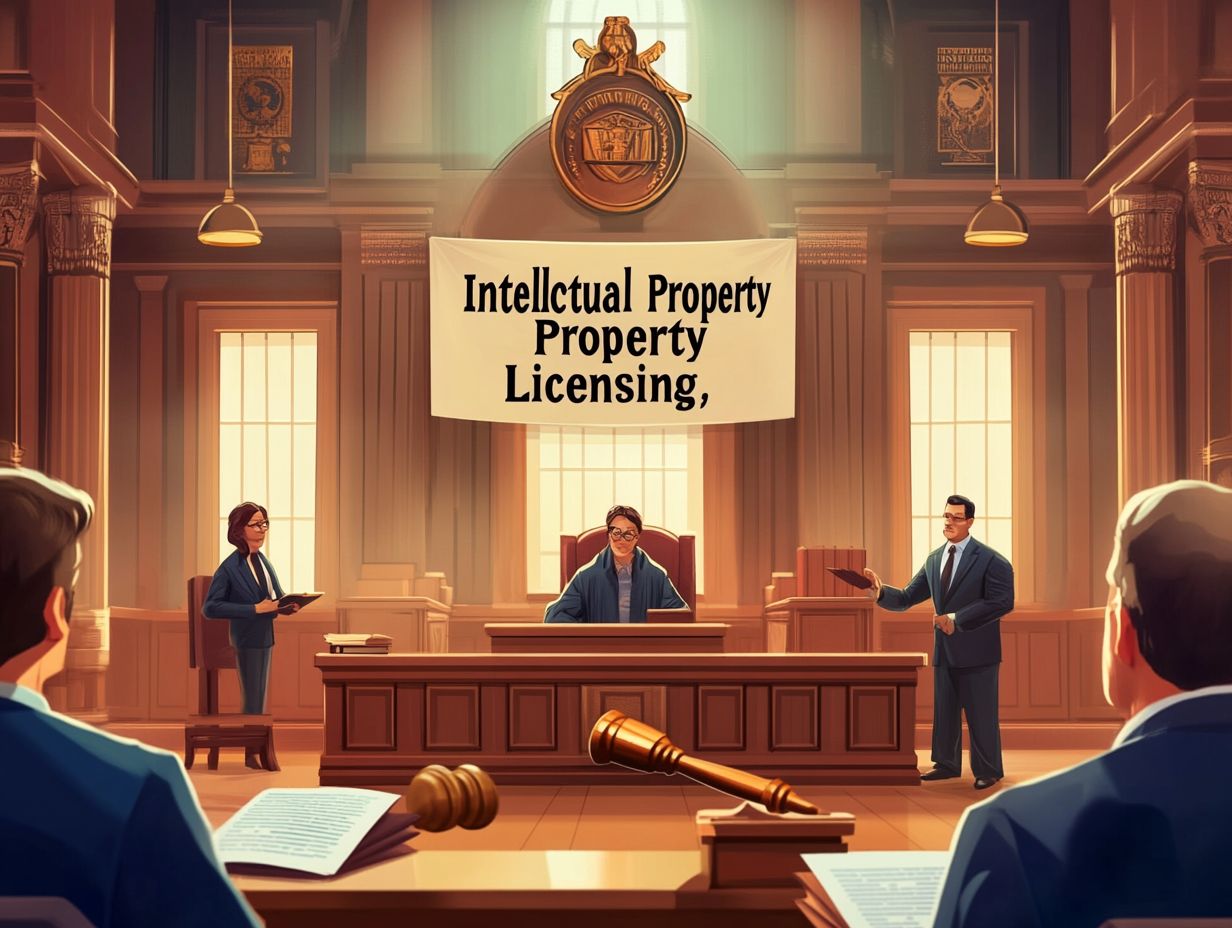
What is the importance of licensing in IP litigation?
Licensing is key in IP litigation. It allows individuals or companies to legally use, sell, or distribute intellectual property, avoiding infringement lawsuits. Understanding the importance of public relations in IP litigation can also play a crucial role in navigating these challenges effectively.
It also enables IP owners to generate revenue by granting usage rights to others.
How does licensing impact IP litigation cases?
Licensing significantly impacts IP litigation cases, as it can demonstrate that the defendant had permission to use the disputed intellectual property, highlighting the importance of a strong IP policy in litigation.
This can weaken the plaintiff’s case and potentially lead to a favorable outcome for the defendant.
What are the benefits of obtaining a license in IP litigation?
Obtaining a license in IP litigation offers several advantages. It helps avoid costly lawsuits and secures permission to use intellectual property. Additionally, understanding the role of the USPTO in IP litigation can generate revenue for IP owners and foster better relationships between parties involved.
What are the consequences of not obtaining a license in IP litigation?
Failing to obtain a license in IP litigation can lead to serious issues. This includes facing infringement lawsuits, paying hefty damages, and losing the right to use the disputed intellectual property. It can also harm the reputation of the infringing party.
How can a lawyer assist with licensing in IP litigation?
A lawyer plays a crucial role in licensing during IP litigation. They negotiate and draft agreements that protect both parties’ rights and provide legal advice on the necessity of a license.
Is obtaining a license always necessary in IP litigation?
Obtaining a license isn’t always required in IP litigation. In certain situations, fair use or a patent’s expiration may allow for using intellectual property without a license. It’s wise to consult with a lawyer to evaluate the need for a license in each case.



